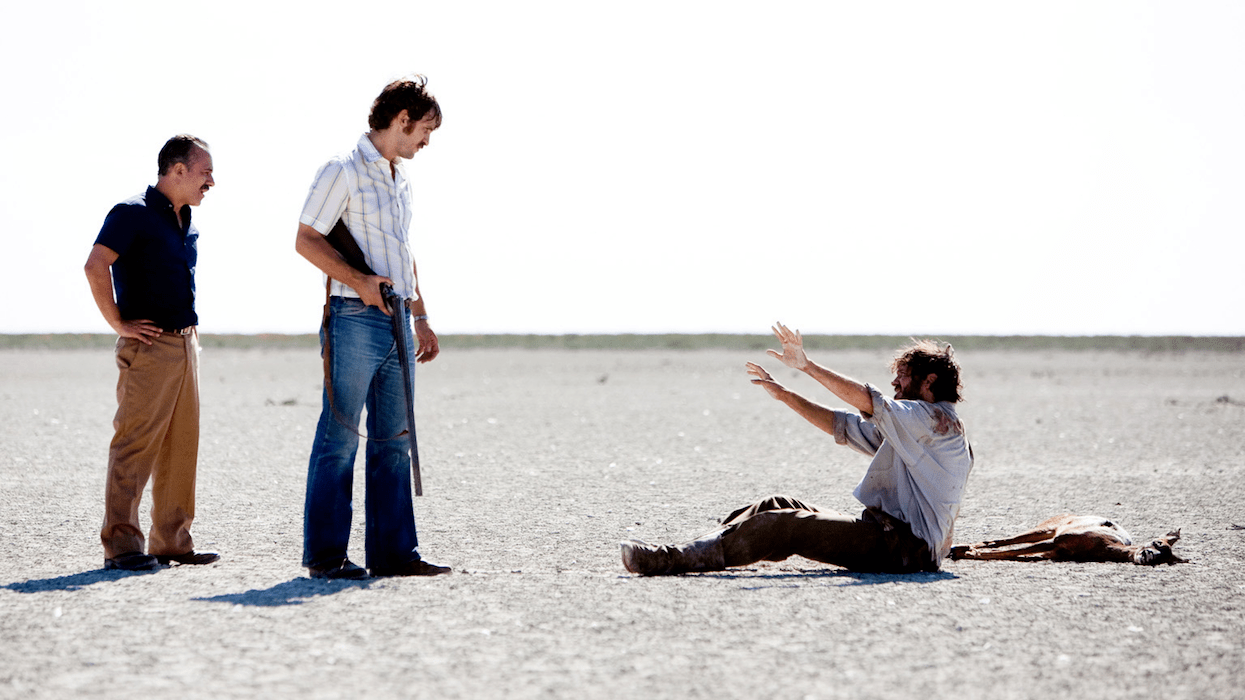By Chlotrudis Independent Film Society
Rating: 4.25 cats
Director: Alberto Rodriguez

Original language title: La Isla Mínima
Country: spain
Year: 2015
Running time: 105
IMDB: http://www.imdb.com/title/tt3253930/combined
Jason says: “While, to a certain extent, murder is murder, a story that could be easily set in any era becomes much more fascinating when placed in a specific time, and not just because cell phones, GPS, and security cameras make things ‘too easy’. MARSHLAND, for instance, could easily be done in the present day, but setting it in 1980, a time when Spain was very much in transition, makes it even more thrilling.
“The period is most visible in the detectives sent to a small town to investigate a pair of missing sisters – Juan (Javier Gutierrez) has had a long career under the Franco regime, and tends to think in terms of having dictatorially-backed authority; Pedro (Raul Arevalo) is younger and has seen his career stall as a result of writing a liberal-leaning letter to the editor he wrote. It’s soon clear that mother Rocio (Nerea Barros) has something to share and father Rodrigo (Antonio de la Torre) has something to hide, but even more importantly, the father of another girl who went missing a year earlier convinces them that this may be the work of a serial killer. They soon have a suspect (Jesus Castro), though forensics seem to imply it wasn’t him, and a potential next victim (Ana Tomeno) – but can they uncover the truth while still acting within the law?
“That, arguably, is the real story that director & co-writer is telling, and it’s one that never truly gets old: The very nature and importance of police work lends itself to abuse of authority that creates mistrust, and those who would attempt reform and the old guard are never going to see eye to eye. Rodriguez seldom has Juan and Pedro actively opposing each other – indeed, Juan seems to support Pedro in principle even if he tends toward the pragmatic – but there’s a tension underneath that he constantly fans, and the difficulty of having police with different values and histories working together is the idea that the film ends on and wants the audience to ponder afterward.
“It keeps the two actors playing the detectives in the spotlight, and they do well there. Raul Arevalo plays Pedro as a bit prematurely worn down, even if it’s not visible on his face as opposed to the way he just clearly doesn’t want to talk about his letter when it’s brought up or how he has few answers for his wife on the other end of the phone. He comes across as clearly smart and determined and maybe in the middle stages of losing his naivete about certain things. In some ways, the more interesting character is Juan; the script sets him up as perhaps paying a karmic price for serving a dictator and even if he seems okay with that, he hasn’t exactly changed his ways. In some ways he just seems more seasoned – he knows what to do that’s not quite procedure but not quite outside of it – and in those situations he’s got a roguish appeal that Javier Gutierrez is able to carry through to when Juan crosses lines from the unconventional to potentially dangerous. He gives the impression of knowing he’s a dinosaur in the new, democratic Spain but not being interested in evolving.
“For as much as the soul of the film is watching the detectives, it’s not a bad crime story up front. It’s a police procedural rather than a mystery that presents most of the important information up front, which means Juan and Pedro spend the movie digging deeper into the muck and finding new things even late in the game. The details are nasty and just get more uncomfortable as things go on, although not so much that the focus becomes how depraved things can get. There’s also some entertaining use of how the local underworld tries to point Juan and Pedro in the right direction so they’ll go without stumbling upon too many of their own activities.
“Rodriguez unfurls the story in fine style, never rushing forward but never giving the impression of dawdling. He also makes an impressive-looking movie, getting period details right but not drowning in them; the idea is to create something that also feels contemporary in spirit. Visually, he and cinematographer Alex Catalan create some impressive images, often shrinking the characters in one way or another: There are several straight-down shots where the people become ants rushing about a scene while cars on the side show activity going forward around them, for instance, and the camera will often be set up very low and far away so that the environment that is usually the background becomes the foreground, with Juan, Pedro, and others doing their business in the upper third of the screen.
“It’s striking, thoughtful, and suspenseful enough to have been a major award winner in Spain last year, though that doesn’t seem to have landed it a US release yet. Hopefully it will soon; it’s a fine big-screen movie on looks alone, and quite a good thriller besides. 4.25 cats
“Seen 3 August 2015 in Theatre Hall Concordia (Fantasia International Film Festival, DCP).”
